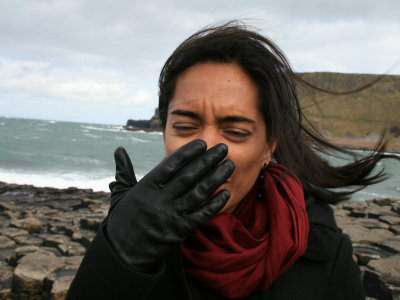``Why colds and flu are prevalent in winter'' revealed by new research

Infectious diseases such as colds and flu become prevalent in winter, but the reason is that 'viruses are more contagious in cold and dry environments' and 'they spend more time indoors where viruses and bacteria can easily spread.' ” is mentioned. A study by a team at Harvard University and Northeastern University discovered a new biological mechanism that ``the immune function in the nose is impaired when it gets cold'', and researchers say this may be the reason why infections increase in winter. explained.
Cold exposure impairs extracellular vesicle swarm–mediated nasal antiviral immunity - Journal of Allergy and Clinical Immunology
Why Upper Respiratory Infections Are More Common in Colder Temperatures | Harvard Medical School
https://hms.harvard.edu/news/why-upper-respiratory-infections-are-more-common-colder-temperatures
Why colds and flu viruses are more common in winter | CNN
https://edition.cnn.com/2022/12/06/health/why-winter-colds-flu-wellness/index.html
Infectious diseases usually become prevalent in winter, but the bacteria and viruses that cause infectious diseases exist all year round, not just in winter. Benjamin Bleier, an otolaryngologist at Harvard Medical School, explains why infections nevertheless rise in the winter. was thought to be prevalent in the cold season.'
There are several ways that viruses and bacteria can infect the human body. Among them, the nostrils are one of the main contact points in the body with the external environment, and the immune response in the nostrils is important in preventing infections. A 2018 study by Bleier et al. found that when cells in the nostrils detect a pathogen, large amounts of extracellular vesicles (EVs) are released into the mucus in the nostrils, surrounding and attacking the pathogen. .
EVs have up to 20 times more receptors than cells, and 13 times more microRNAs that attack viruses than normal cells. 'EVs cannot divide like cells, but they are like mini-versions of cells specifically designed to kill things like the flu virus,' Bleier said. The virus will attach to these decoys instead of the cells,' he said, pointing out that EVs prevent the virus from entering the body.

Bleier et al.'s research team conducted an experiment to investigate how changes in the internal temperature of the nose affect EV emission while studying the relationship between EV emission by nasal cells and viruses. First, the research team confirmed that when healthy volunteers were exposed to a cold environment of 4.4 degrees Celsius from the indoor environment for about 15 minutes, the temperature of the nostrils decreased by 5 degrees Celsius.
Subsequently, when this temperature reduction was applied to nasal tissue samples and the immune response was observed, the amount of EVs secreted from the cells was reduced by 42%, and the number of receptors and microRNAs contained in EVs was also reduced by more than half. It turned out to be.
'That's enough to knock out the three immune benefits that the nose has,' Bleier said. is halved,” he said.
Professor Zara Patel, an otolaryngologist at Stanford University School of Medicine, who was not involved in the study, said the study is the first example of a biological explanation for the limitation of innate immune responses due to temperature drops. On the other hand, he said, ``It is necessary to keep in mind that these are in vitro studies,'' and pointed out that the same reaction would not necessarily be seen in vivo.

Based on the series of research results, the research team hopes to develop treatments that induce and strengthen the innate immune response of the nose in the future, and nasal drops that increase the number of EVs and EV intrareceptors.
Also, wearing a mask may prevent direct exposure of the nose to cold air and may help keep immunity high. ``Masks don't just keep you from breathing in the virus directly, they're like putting a sweater over your nose,'' said Bleier. It just makes the mechanics work better, maybe one more reason why you need a mask!'

Related Posts:
in Science, Posted by log1h_ik







